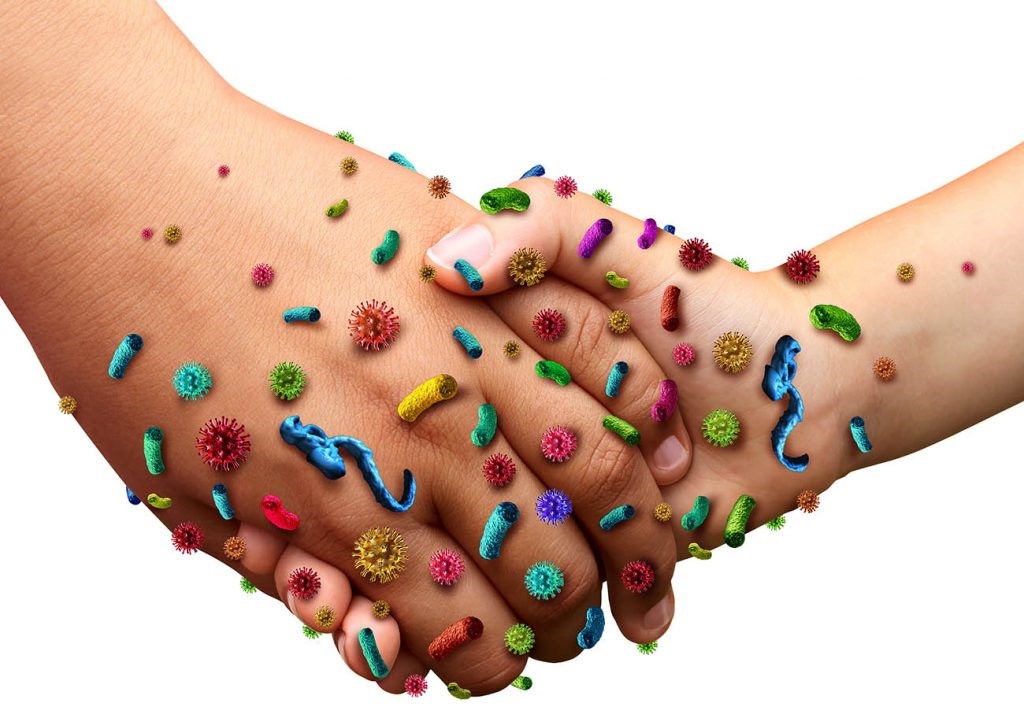Since the beginning of the war in Ukraine, the risks of infectious diseases have increased. They are caused by bacteria, viruses, fungi, or parasites. And the disease can occur both with mild symptoms and life-threatening. Therefore, it is important to understand your risks of infection and take care of your health and your loved ones.
Many organisms live in and on our bodies. Usually, they are harmless or even beneficial. But under certain conditions, they can cause disease.
Some infectious diseases can be passed from person to person. Some are transmitted by insects or other animals. Others are spread through infected food or water, or exposure to organisms in the environment.
Signs and symptoms vary depending on the pathogen but often include fever and fatigue. Mild infections can be treated with rest and home remedies, while some life-threatening infections may require hospitalization.
Many infectious diseases can be prevented with vaccines. So follow the Vaccination Calendar carefully.
Frequent and thorough hand washing also helps protect against most infectious diseases.
The easiest way to catch most infectious diseases is through contact with an infected person or animal. Infectious diseases can be transmitted through direct contact, for example:
- Face to face. Infectious diseases are usually spread by the direct transmission of bacteria, viruses, or other germs from one person to another. This can happen when a person with a bacteria or virus touches, kisses, coughs, or sneezes on someone who is not infected. Pathogens can also spread through bodily fluids during sexual contact.
- From animal to human. If you are bitten or scratched by an infected animal, even a pet, you can become ill and in extreme circumstances even die. Handling animal waste can also be dangerous. For example, you can become infected with toxoplasmosis when cleaning a cat's litter box.
- From mother to child. A pregnant woman can transmit germs that lead to infectious diseases to her unborn child. Some germs can pass through the placenta or breast milk. Germs in the vagina can be passed to the baby during delivery.
Pathogens can also be transmitted indirectly. Many germs can linger on everyday objects, such as countertops, door handles, or faucets.
For example, when you touch a doorknob after having the flu or a cold, you can become infected. Especially if you touch your eyes, mouth, or nose before washing your hands.
Some germs are transmitted through insect bites such as mosquitoes, fleas, lice, or ticks.
Pathogens can also be in contaminated food and water. Therefore, follow the rules of food safety.
Each infectious disease has its specific signs and symptoms. The most common ones include the following:
- high body temperature;
- diarrhea;
- fatigue;
- muscle pain;
- cough.
Seek medical help if:
- you have been bitten by an animal;
- you have problems with breathing;
- cough lasts longer than a week;
- severe headache with fever;
- a rash or swelling appears;
- unexplained or prolonged fever;
- sudden problems with vision.
Although anyone can get infected with infectious diseases, people with suppressed immune systems, for example:
- people taking steroids or other medications that suppress the immune system, such as anti-rejection drugs for transplanted organs;
- people living with HIV;
- cancer patients and people with chronic diseases that affect the immune system;
- older people, children, and pregnant women.
Talk to your doctor about your risk for certain infections, especially if you are not vaccinated or have a weakened immune system. Disinfect scratches and wounds, and control chronic diseases if you have them.
To reduce the risk of infection, follow these simple tips:
- Wash your hands. This is especially important before and after preparing food, before eating, and after using the toilet. And try not to touch your eyes, nose, or mouth with your hands, as this is a common way for germs to enter the body. Regular hand washing is one of the best ways to remove germs and prevent disease. Remember that pets can also carry germs. After contact with animals and cleaning up after them, wash your hands thoroughly with soap and water. If this is not possible, use alcohol antiseptics.
- Get vaccinated.Vaccination can significantly reduce the risks of getting many diseases. Be sure to get vaccinated according to the national vaccination schedule, vaccinate your children, and advise your loved ones to do the same. This applies equally to both children and adults. Catch up with missed vaccinations of children by age. Understand and compare the risks and benefits of vaccination.
- Observe respiratory hygiene and cough etiquette. So, even if you are sick, you will not let the infection spread further. This is extremely important, because there may be people nearby whose body is weakened by diseases such as diabetes mellitus or hypertension, for them the usual ARVI can have severe complications. If you are sick, stay home.
- Cook food safely. Keep kitchen tables and other kitchen surfaces clean when preparing food. Use safe water and fresh food. Cook foods to the right temperature, and thoroughly broil or boil foods, especially meat, eggs, and seafood. Separate raw food from cooked food. Do not leave cooked foods at room temperature for a long time.
- Practice safe sex. Rule number 1 - protected sex during every sexual contact. Use condoms if you have vaginal, anal, or oral sex. When used properly and consistently, condoms are one of the most effective ways to protect against STIs, including HIV, and prevent unwanted pregnancy.
- Do not share personal hygiene products with others. Use your own toothbrush, comb, and razor. Avoid sharing drinking glasses or cutlery.
- Do not take the use of antibiotics lightly. Ask your doctor if there are any measures that you can take for recovery to avoid the use of antibiotics. But if the doctor insists - use the drug strictly following the prescribed dose and the number of days of administration.
Information from the Public Health Center of the Ministry of Health of Ukraine https://phc.org.ua/news/riziki-infekciynikh-zakhvoryuvan-yak-proyavlyayutsya-i-yak-zakhistitisya

